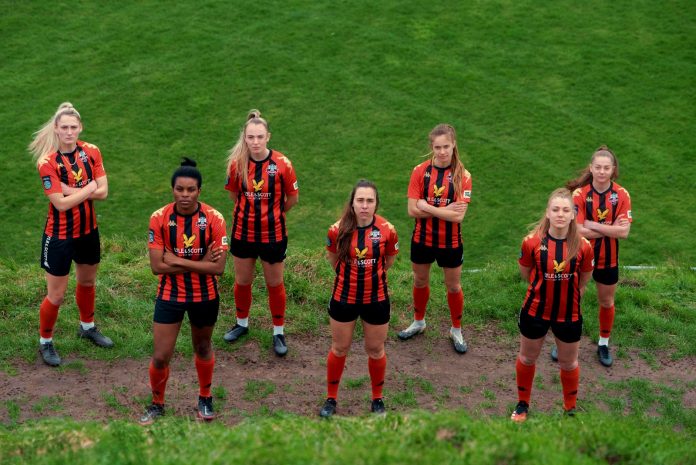Lewes FC, the only semi-professional or professional club in the world to pay it’s men’s and women’s teams equally, has today released a film reflecting on The FA’s decision to ban women’s football 100 years ago.
Commissioned to coincide with International Women’s Day, the film explores the long-term impact the 50-year ban had on the women’s game in England.
Fronted by former England International, Women’s Super League player and Lewes FC director, Claire Rafferty, the provocative vignette charts the rise of women’s football in the early 20th century, when it grew almost as quickly as the men’s game, reaching new heights in the period immediately after the First World War.
The ban on women’s football
As women took their places in munition factories to support the war effort, they formed teams for fun. But unexpectedly, women’s football began attracting tens of thousands of fans to matches across the country even after the men’s Leagues had restarted. This popularity reached its zenith when a match between Dick Kerr’s Ladies and St Helens saw 53,000 fans attend Goodison Park on Boxing Day 1920, with a further 14,000 people locked out of the ground.
Then, in 1921, The FA took the decision to ban women’s football, essentially outlawing the game in England, suddenly deeming it ‘quite unsuitable for females’. They ordered clubs to ‘refuse the use of their grounds for women’s matches’ and forbade its members from acting as referees or linesmen at women’s games.
Although the FA claimed that the reason for the ban was to ‘protect’ women, it was widely purported that the growing popularity was seen as a threat to the men’s game. The ban, which would last 50 years in total, changed the course of women’s football in England forever. Finally, under pressure from UEFA, the ban was lifted in 1971, though even then, no official FA Women’s Football Committee was created until 1993.
The cost of the ban

Commenting on her role in the film, Claire Rafferty said: “It’s been a thought-provoking experience to dig deeper into the history of women’s football in England. I think a huge majority of football fans have no idea that this ban was ever in place, why it was introduced or that it lasted so long. It’s almost impossible to calculate the true cost of the damage it did to the development of the women’s game but, there is no doubt, the gap in resources, revenues and opportunities would be far more equal if it had never been in place.”
As Gail Newsham, a former player and women’s football historian, remarks in the film: “Generations of people have been brought up to believe that football is not a game for women and, unfortunately, there are still a lot of people who think that.”
Rafferty continues: “When I was growing up I experienced first-hand the lack of opportunity and access to facilities compared to my male counterparts. That’s why I’m thrilled to present this film and be a part of the Lewes FC collective, to show that there is a progressive model, with equality and community at its heart, that football fans can get behind.”
Choose to Challenge

Maggie Murphy, general manager at Lewes FC, who commissioned the film, said: “The 50-year ban held back on-pitch progress but also stoked still-present discrimination against women involved in all aspects of football, whether as players, pundits, referees or coaches. Together with Lyle & Scott we wanted to share this story with a wider audience and encourage more clubs to put equality at the heart of their operations.
“This year’s International Women’s Day slogan – “Choose to Challenge” is at the heart of what we as a club set out to do. The good news for girls and women everywhere is that positive change is happening and we are proud of our role in that. Equality and inclusion is the future of football and we hope that other clubs around the world will take inspiration from the example we are setting.”
Read more: What it’s like to be a women’s football coach
To find out more about Lewes FC, visit: www.lewesfc.com

